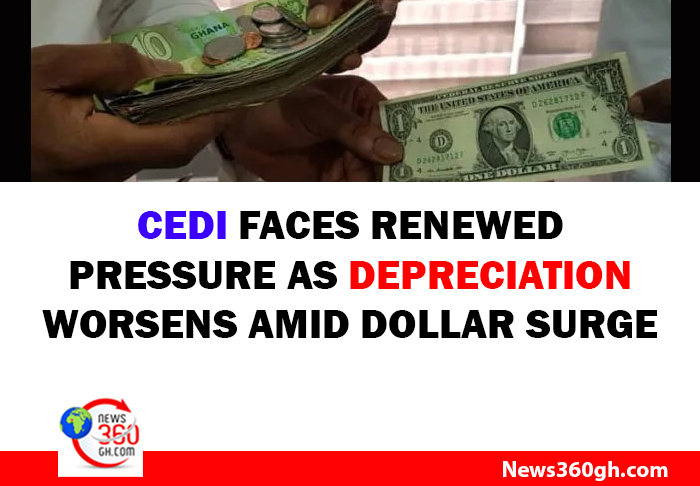
The Ghanaian cedi, which had shown marginal recovery against the US dollar in recent weeks, has once again fallen sharply, ending the last week of September 2024 with significant depreciation against major global currencies. According to the latest report from the Bank of Ghana, the cedi experienced a depreciation rate of 24.3% against the US dollar, up from the 21.3% rate recorded in August 2024. On a year-over-year basis, the cedi’s depreciation stands at 22.9%.
In September 2023, the cedi exchanged at GHS 11.12 to $1; however, it now trades at GHS 15.70 per $1 based on interbank rates, with rates quoted by banks and forex bureaus being slightly higher, ranging from GHS 16.40 to GHS 17.00.
The British pound also saw notable gains against the cedi, with the local currency depreciating by 27.7% against the pound in 2024, compared to a 22.9% depreciation in 2023. Meanwhile, the cedi’s depreciation against the euro reached 25.0%, a rise from the 22.3% depreciation recorded a year earlier.
The continued weakening of the cedi is causing concern for the economy, businesses, and everyday citizens in Ghana. This comes at a time when the country is grappling with rising inflation and import costs. The government, after receiving the second tranche of a USD 3 billion Extended Credit Facility from the IMF earlier this year, had hoped for some stabilization of the cedi. However, the influx of foreign exchange has not been sufficient to halt the currency’s decline.
With the festive season approaching, there is an anticipated increase in demand for foreign currency, which could exacerbate the cedi’s troubles. As importers seek more dollars for goods ahead of the Yuletide, the cedi is likely to face additional downward pressure.
Current Exchange Rates
Today’s dollar-to-cedi exchange rates vary across different platforms. In forex bureaus, the dollar trades between GHS 16.40 and GHS 17.00. Below are the current exchange rates from various service providers:
| Service/Bank | Buy Rate (GHS) | Sell Rate (GHS) |
|---|---|---|
| LemFi | 15.65 | – |
| Afriex | 15.61 | 17.00 |
| Aboki | 16.00 | 16.40 |
| Binance P2P | 16.26 | 16.24 |
| KuCoin P2P | 16.44 | 16.16 |
| CBG Bank | 15.77 | 16.05 |
| Stanbic Bank | 15.39 | 15.98 |
| CalBank | 15.30 | 15.98 |
| Absa Bank | 15.40 | 15.97 |
| Standard Chartered | – | 15.97 |
| Fidelity Bank | 15.30 | 15.95 |
| Zenith Bank | 15.42 | 15.94 |
| UBA | 15.50 | 15.90 |
| GTBank | 15.38 | 15.88 |
| GCB Bank | 15.65 | 15.85 |
| Ecobank | 15.40 | 15.82 |
| Bank of Ghana | 15.79 | 15.81 |
| Access Bank | 15.50 | – |
| WorldRemit | 15.50 | – |
| Remitly | 16.17 | – |
| Wise | 15.70 | – |
| Taptap Send | 15.60 | – |
| Sendwave | 15.44 | – |
| Western Union | 15.43 | – |
| Revolut | 15.74 | – |
| OA Pay | 15.54 | – |
Future Outlook
The cedi’s depreciation may intensify as demand for the dollar increases toward the end of the year, especially with the festive season around the corner. Higher demand for foreign exchange, coupled with high import levels, is expected to exert additional pressure on the local currency, further weakening its value. This persistent depreciation of the cedi underscores the need for long-term solutions to stabilize the currency and relieve economic pressure on Ghanaians.







